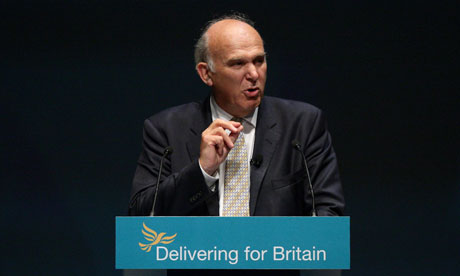Comrade Cable? I don't think so
Vince Cable is no Marxist. In pushing for greater competition in business he fails to see that it isn't the cure – it's the disease

Vince Cable's assault on "spivs and gamblers" in the City may have won him a standing ovation at the Lib Dem conference, but it has caused outrage at the Daily Mail and in the Confederation of British Industry. Is it time for Marxists to welcome Comrade Cable to our ranks?
I don't think so – and not just because he is so lacking in doctrinal savvy as to call Bob Crow a "Trotskyite". His speech falls into a long tradition of politicians trying to distance themselves from what Ted Heath denounced in 1973 as the "unpleasant and unacceptable face of capitalism".
Cable invokes the authority of Adam Smith, and, though he denounces capitalism, his real beef is with capitalists. It is they, Smith argued in The Wealth of Nations (1776), who distort the workings of capitalism by rigging markets and fixing prices. Cable's remedy, like Smith's, is more market, more competition. "Competition is central to my pro-market, pro-business, agenda," he says.
But there's a problem with this recipe. The New Labour government, about whose economic policies Cable is so scathing, extended the deregulation of the City in the name of promoting greater competition. It was the increasingly desperate struggle among banks and shadow banks to squeeze out every dime they could by flogging subprime mortgages that precipitated the present economic and financial crisis.
So competition isn't the cure – it's the disease. We live under an economic system that is driven by a blind process of competition in which firms and even states look only to their own advantage. These rivalries produce not only terrible economic crises but also the increasing destruction of the natural world that threatens planetary disaster.
It's true that the bank bailouts have left the financial sector both here and in the United States dominated by a few giants. Had Cable bothered to read The Poverty of Philosophy, Marx's critique of fantasies of a purified market economy, he might have learned that "monopoly produces competition, competition produces monopoly. Monopolists are made from competition; competitors become monopolists … monopoly can only maintain itself by continually entering into the struggle of competition."
Cable signals his agreement with the Bank of England's Mervyn King, who argues that banks that are "too big to fail" should be broken up. But there is no chance of George Osborne, who won the Whitehall battle with Cable over who should control the coalition's banking policy, allowing this to happen.
This is the ultimate contradiction around which Cable squirms in his speech. He may reject laissez-faire and unrestrained capitalism, but he is in coalition with a Tory party whose leaders are, in economics, unreconstructed Thatcherites. Osborne, with David Cameron's backing, has seized on the budget deficit drastically to shrink the size of the state.
Fiscal austerity will have devastating effects on the fabric of social life. As the International Monetary Fund recently warned, it may also kill off the economic recovery. With firms and households still short of money, cutting public spending will kick away the main prop holding up the economy.
So Cable's membership application will have to wait. While he is an honoured guest at the Tory conference in Birmingham, I will be outside on 3 October, demonstrating with the Fight for the Right to Work campaign.

No comments:
Post a Comment
Comments